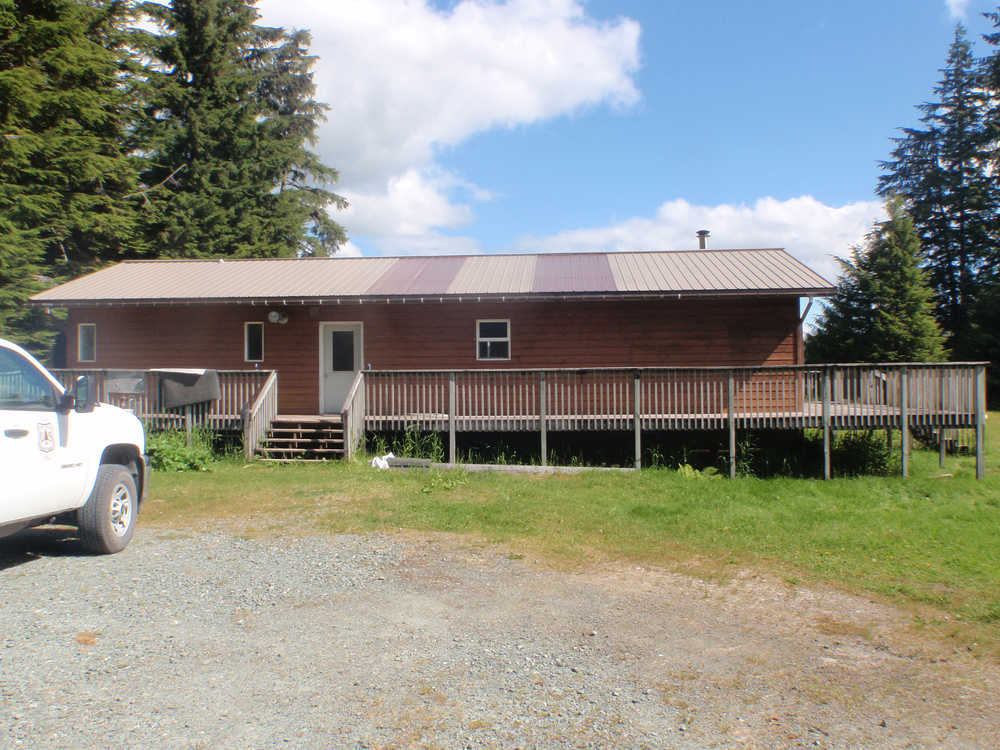Just a few years ago, the Craig Ranger District Forest Service remote administrative camp on Polk Inlet on Prince of Wales was slated for destruction. Now, it’s the island’s most popular recreational cabin.
The reason? A ranger who saw the waste of a good building in a beautiful place, and a group of volunteers who got together in the spring of 2014 to revamp it.
Last year, said Forestry Technician Katie Rooks, the cabin was occupied 100 out of 150 days — one of the highest rates of use on the Tongass National Forest. (You can’t drive there in the snowy months, and fewer people arrive by boat in the winter.)
“We were talking about tearing it down, and it seemed like a real shame, because the structure is in okay condition,” said Prince of Wales district ranger Matt Anderson.
The Forest Service has recently been taking down buildings that have high maintenance costs, but Anderson was pretty sure it could be profitable, or at least close to it, as a recreational cabin. He sat down with people at the Forest Service – the Forest Supervisor, the engineering department, which handled the building, and others. They wrote out a business plan and transferred the building to the recreation department.
Then Anderson spoke with an informal local organization, the Prince of Wales Friends of Recreation, and over the course of a long weekend, with about 12 volunteers and some supplies, “we completely renovated the place,” he said. They took out old appliances and some sheds, cut four or five cords of firewood.
“We just put in a tremendous amount of work,” he said.
The volunteers still help maintain it and cut firewood, Anderson said.
Now, even Anderson had a hard time finding a weekend to rent it with his family last year.
Between May 1 and Oct. 4 this year, the cabin was occupied 80 percent of the time Friday, Saturday and Sunday, and 61 percent of the time during the week, Rooks said.
Previously, the most-used cabin on POW was Twelvemile Cabin, which is in the same area.
Each cabin takes about $8,000 per year to maintain and Polk made $6,975, meaning it’s “very close to being self-sufficient,” Rooks wrote in an email.
“I think people like the idea of taking an old facility that was no longer going to be used for its original purpose — a remote camp to house timber surveying and crews — and repurposing it,” Rooks said. “It epitomizes the economic sustainability concept that goes … with environmental sustainability.”
“There are no additional roads. It didn’t create a footprint. There are no additional trees that needed to be cut to command the view that it has over the inlet,” she said. “People saw someone doing a common sense thing rather than destroy a perfectly good building…. Hopefully it helps people realize we’re trying to work for them, not against them. It’s just sometimes hard for us to buck our own internal workings, but it’s a great example of it.”
Ultimately, “it was a fairly simple internal process,” Anderson said. “What we’re trying to do Tongass-wide is take a look at all facilities — cabins, administrative sites — and see what’s the deferred maintenance on it, and is it sustainable…. We can’t afford what’s out there currently, so how do you repackage it to make it bring in a little more revenue?”
The cabin has three bedrooms, a kitchen, a bathroom, running (and hot) water May through November, and you can drive right up to it.
“It’s something that I think several folks are proud of and we’ll see if we can do something (else) similar,” Anderson said.
“I thought it was pretty neat he (Anderson) approached it that way,” said volunteer Michael Kampnich. “It turned out to be a rip-roaring success.”
• Contact Capital City Weekly staff writer Mary Catharine Martin at maryc.martin@capweek.com.
For more information about Polk Camp, go here: http://www.recreation.gov/camping/polk-camp/r/campgroundDetails.do?contractCode=NRSO&parkId=120890.

